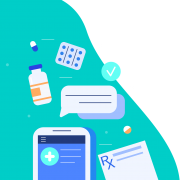
Covid-19 has reshaped many industries ’ way of operation.
However, one of the significant shifts has been seen in the healthcare industry to stop the increasing coronavirus spread worldwide. We saw technologies like augmented reality, artificial intelligence, AI-integrated chatbot, blockchain, Internet of Things, big data analytics, and machine learning emerged into the healthcare industry to fill the gap of no-human contact during this Covid-19 pandemic.
The above technologies have made it possible to pass this critical situation worldwide and avail the most reliable patients worldwide.
Furthermore, this whole thing happened because of a sudden rise in developing telemedicine mobile applications serving a different purpose for patients, even healthcare professionals like doctors, nurses & ground staff.
Also, it made the time-consuming processes easier & faster. Hence, the overall procedure of vising a doctor by booking an appointment to getting diagnosed becomes a lot hassle-free. Below are a few brief explanations of how it becomes possible by building mobile telemedicine applications.
Now let us dive into how these technologies have reshaped the healthcare sector so far.
- Instant Solution with AI-Chatbot Integrated Application
- Blockchain Secures the Payment Activity
- Patient Diagnosis Become Easy with Augmented Reality
- Big Data Analytics Helps in Tracking Medical Record
- Artificial Intelligence Ease the Prescription Programs
- IoT make sure the connectivity of medical equipment
So how do all these above aspects contribute to the transformation of the healthcare industry?
- Instant Solution with AI-Chatbot Integrated Application
In the traditional healthcare sector, getting instant assistant from any medical practitioner is challenging; there are numbers of procedures one needs to go through before reaching an experienced professional for guidance and what safety measures they can take during an emergency, which can cause massive harm to the patient.
A mobile application that has AI-chatbot integration for patients could be a lot different from the above one.
Suppose you require immediate medical help, just tapping on mobile screens, and you got the exact medical solution you needed with the use of a pre-determine AI algorithm that matched the precious scenarios and finds the best in-hand solution for you, without wasting your time in those traditional procedures.
Would it not be beneficial?
- Blockchain Secures the Payment Activity
Earlier paying the medical bills were too much headache, an individual need to find the insurance, bank details, collect the cash, and then again do the hospital’s papers, and the security part was not that much accurate at that time, however, with the advent of technology things become much faster & secured for not just patients & but for the hospitals as well.
Blockchain technology avails an efficient solution with its numerous secured tech vulnerabilities of end-to-end encryption while transferring the funds.
Even with the help of integrated mobile wallets, all this payment procedure becomes 5 to 10 minutes of the task.
- Patient Diagnosis Become Easy with Augmented Reality
Back in those days when technology was not that much indulge in the healthcare sector, it was impossible to do critical surgeries in hours. Instead, it takes days to decide and finalize the whole process of finding the right way of approaching the cause of the surgery.
But not anymore, incorporating Augmented Reality with artificial intelligence gave the best solution to this impossible task; with the help of augmented reality, a doctor can visualize the inner situation of a patient and can make a critical decision without wasting any seconds, and the surgeries even become more efficient, and life savior.
- Big Data Analytics Helps in Tracking Medical Record
Tracking progress is one of the vital aspects of medical procedures. The older way of maintaining that critical data was not so accurate, many of those papers got ripped & missing, and a patient has to face the consequences of that condition.
Big data analytics tech took place in this. It made it easier to reform and store the data accurately without documenting them on files, rather than storing them on the cloud for better and easy accessibility.
Incorporating Big data helps medical practitioners identify vital prospects and what changes in a patient’s routine have taken place that causes the malfunctioning.
- Artificial Intelligence Ease the Giving Prescriptions
Prescriptions are essential things in medical procedures, similar to instant assistance through AI-based chatbot integration, artificial intelligence indulges in several parts of the healthcare sector, and medical prescriptions distribution.
By adding artificial intelligence, the algorithms of AI tracks each patient and the consumption of their medicines individually and notify them when, where and which pills they need to take.
Sometimes, when a patient needs medicine and doesn’t know which could be the ideal medicines they need to take, they can get assistance through artificial intelligence previously tracked data.
- IoT Make Sure the Connectivity of Medical Equipments
IoT is also known as the Internet of Things which connects the physical objects with the internet, reduces the workforce, and enhances any process by operating full functionally with mobile application integrations.
A similar solution comes in the healthcare industry workforce as well, where connected equipment eases down the entire medical procedures and faster the surgical work effectively.
Conclusion
The Healthcare sector is moving towards more technological enhancements, and in the coming years, it will be revolutionized completely. And modern-day technologies are playing an essential part in enhancing the way of functioning of the healthcare sector.
